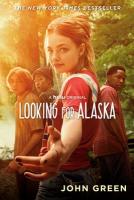
Looking for Alaska, by John Green, is about one boy’s search for meaning. Miles “Pudge” Halter lived a relatively boring and normal life until his arrival at Culver Creek’s Boarding School. It is there that he first meets the brilliant, lovely, and undoubtedly complicated Alaska Young, who sets off a chain of events that will irrevocably change him and his perspective on life.
In theory, Looking for Alaska sounds like a literary great meant to join the many other coming-of-age tales that have made a name for themselves through refusing to shy away from the darker, grittier parts of growing up. Reviews gush out beautiful prose, realistic characters, and a hauntingly beautiful message that is guaranteed to never be forgotten. But considering my strong distaste for John Green’s most famous YA novel, it should be no surprise that I absolutely despised this one too. Yes, there were some deep quotes and lovely prose, as well as a message that is absolutely important for teenagers to hear. But the characters were painful caricatures of reality, the messaging managed to sound condescending and pretentious, and the main character was insufferable. Worse than even our dear narrator was our female main character, Alaska Young herself. Must every female main character in John Green’s novels be what could only be crudely described as a manic pixie dream girl? Oh, yes, she’s very pretty, her every feature etched out in painfully descriptive prose every time our dear narrator lays his eyes on her. And she’s very clever, isn’t it? Spouting off poetic nonsense to a boy that could more or less be a total stranger. Always the same with those female main characters, isn’t it? Don’t worry, she’s a feminist. She’s smart. She’s liberated. She’s fascinating, isn’t she? Quirky, too. In other words, this book disappointed me. A disappointment I should’ve expected, given my own strong opinions on John Green’s most popular YA novel. But one that still makes me a little sad, because there will never stop being a need for coming-of-age novels that manage to capture all the grit and darkness of growing up without being condescending and pretentious. I am not one to be easily turned away from purple prose of deep philosophical books that explore humanity and growing up. And do not be mistaken, John Green is a wonderful writer. But purple prose is rather difficult to stomach when it comes alongside a main character that cannot seem to decide whether he wishes to drool over the quirky love interest or dispose of wisdom and clarity in the form of quotes meant to crush the hearts of their readers. A coming-of-age tale is difficult to stomach when the flaws out way whatever points may be scored with lovely prose and inspiring quotes.
